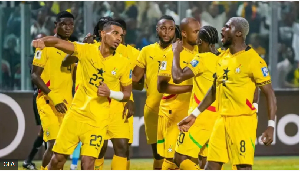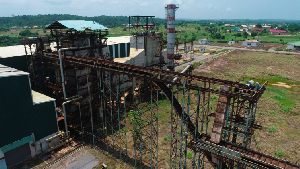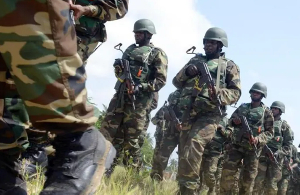-Capt. Baah Acheamfour
By: Korku Devitor
A member of the erstwhile Armed Forces Revolutionary Council (AFRC), Capt. Baah Acheamfour has described as unacceptable the lingering culture of corruption in Ghana, 32 years after the June 4 1979 revolution that waged the most brutal fight against corruption in the history of the country.
This situation he attributed to Ghanaians’ slowness in or refusal to learn the lessons of the June 4 uprising.
Capt. Acheamfour who was speaking to this reporter after the wreath laying ceremony at the Revolution Square last Saturday also did not hide his frustration at the slow pace at which Ghana was developing 32 years after the revolution.
“As a nation, we are either too slow in learning the lessons of June 4, or we are refusing to learn the lessons of June 4. Yes, we have our new democratic setting; we have seen improvements in the economy. We have seen some infrastructural improvements, But in 32 years, I don’t think we have done enough,” the former army officer observed.
He believed that nobody who lived through June 4, 1979, and the short-lived AFRC rule and experienced the trauma of the era would want a repeat.
“For me this day should serve as Ghana’s never-again-day. A day to remind all of us and our leaders, both present and future, where we went wrong, as a nation, and what we must do to avoid a repeat of the experience. For me, this is the relevance of the day,” Capt. Acheamfour argued.
He does also not believe Ghanaian leaders and politicians were upholding the ideals of probity and accountability, social justice and the other ideals of June4 1979, as enshrined in the 1992 constitution.
“Not after the experience of June 4! What about political chicanery, endemic corruption, poverty, I mean Ghanaians are still struggling, while others are accumulating and making it good for themselves,” he averred, adding, “I think we ought to do better, a lot better than we have done so far, after June 4 1979, because it is a long time ago, 32 years ago. I think we are either crawling or refusing seriously to heed the lessons of June 4, and to use it as a guide. “ He said although he would not want another June 4, he hoped Ghanaians would take a cue. “And when I talk about Ghanaians, I am talking about all Ghanaians. I am talking about our political leaders, talking about leaders of civil society, talking about leaders of the bureaucratic set-up, leaders across board, at all levels.”
The retired military officer wanted the celebration of June 4 to be a national affair, as June 4 is as relevant today, as it was in 1979.
He said the whole nation therefore needed to come to grips with it. “As I explained about the relevance of June 4- our never again day, It is for the whole country. Not for any individual, not for any political party. It’s a national thing, so I made this demo, this symbolic appearance first to try to highlight the fact that June 4 does not belong to any individual. It doesn’t belong to any individual,” he emphasised.
Capt. Acheamfour paid tribute to his fallen colleague in the uprising: Lt Agyemang Bio.( He fired the first shot, but unfortunately fell during the process0 I mention Corporal Folivi who fell and died right in front of me, he was an unintended casualty of the first shot fired. I spoke of Corp. Sorkpor who was mown down in front of broadcasting house by a 20mm canon fired from a MOWAG. And I speak of Gen. Odartey Wellington: That Soldier’s soldier, and Col. Enninful who all died for love of their country. They didn’t want to die. And I speak of the rest. I speak of the other generals. Because they all died in the course of our common struggles, you understand.”
Earlier Capt. Acheamfour had joined some of his colleagues to lay wreath in honour of the ideals of the June4 1979 revolution and later together with Former president Rawlings joined some of the other ranks who took part in the revolution to take pictures at the cenotaph.
General News of Wednesday, 8 June 2011
Source: The Lead












